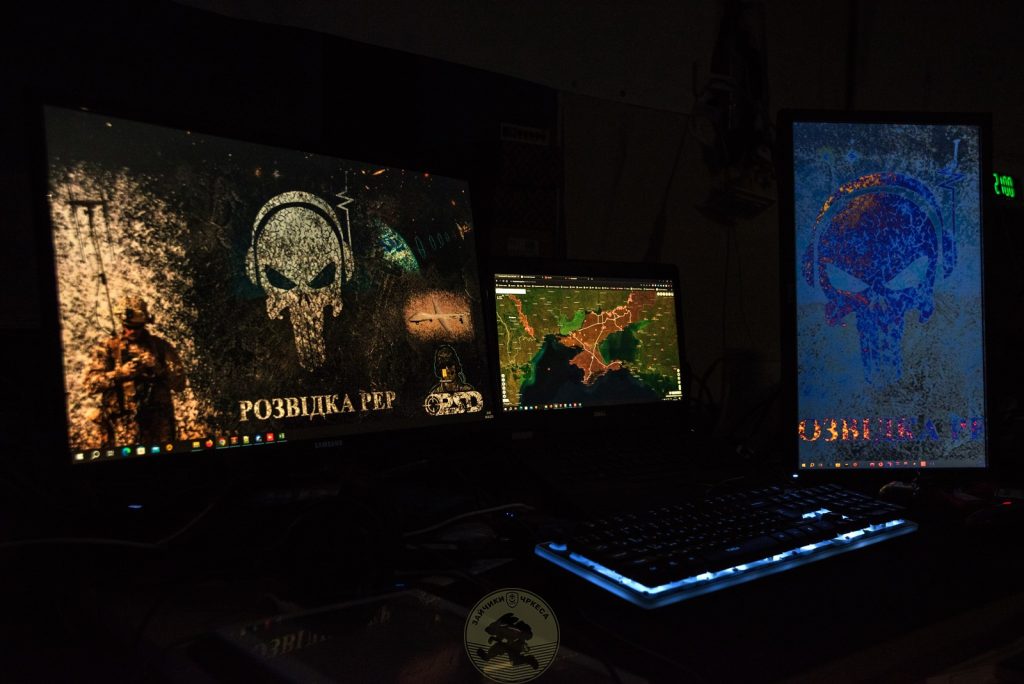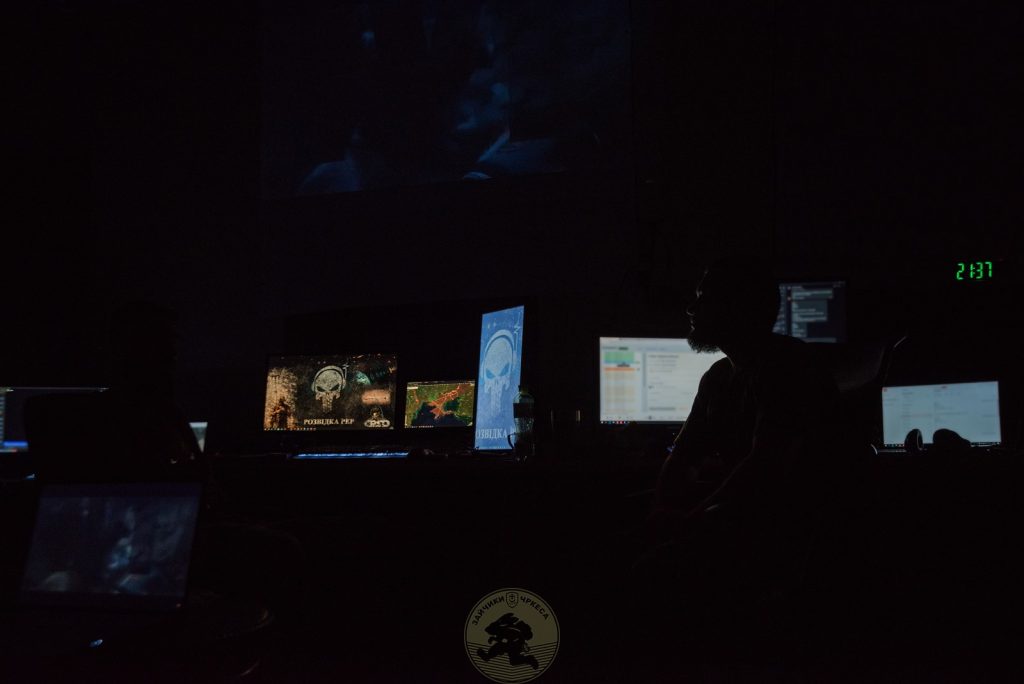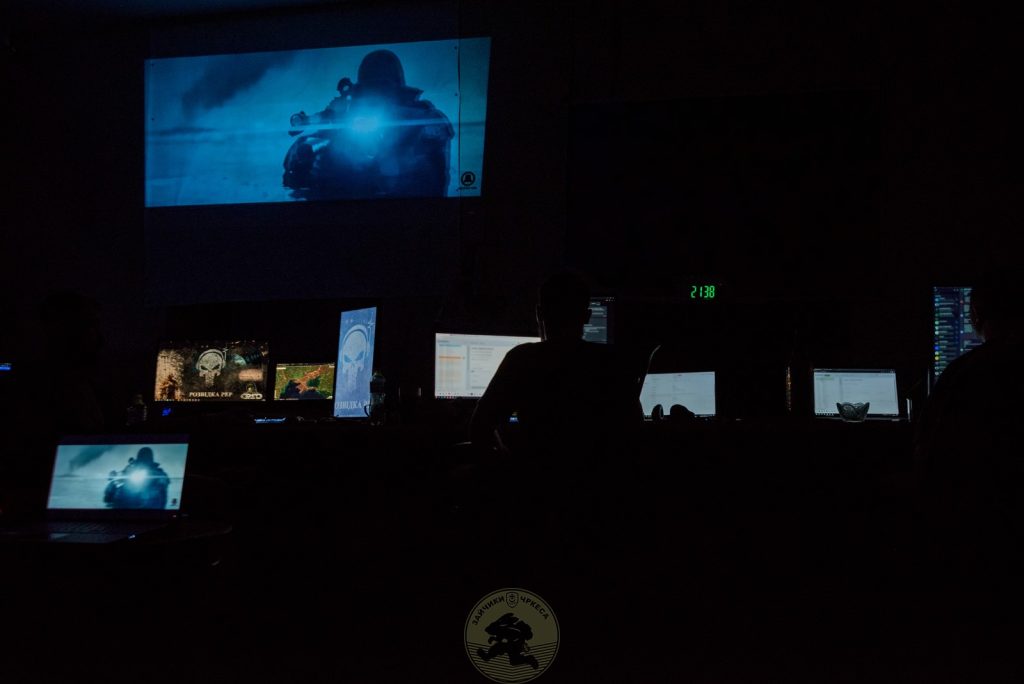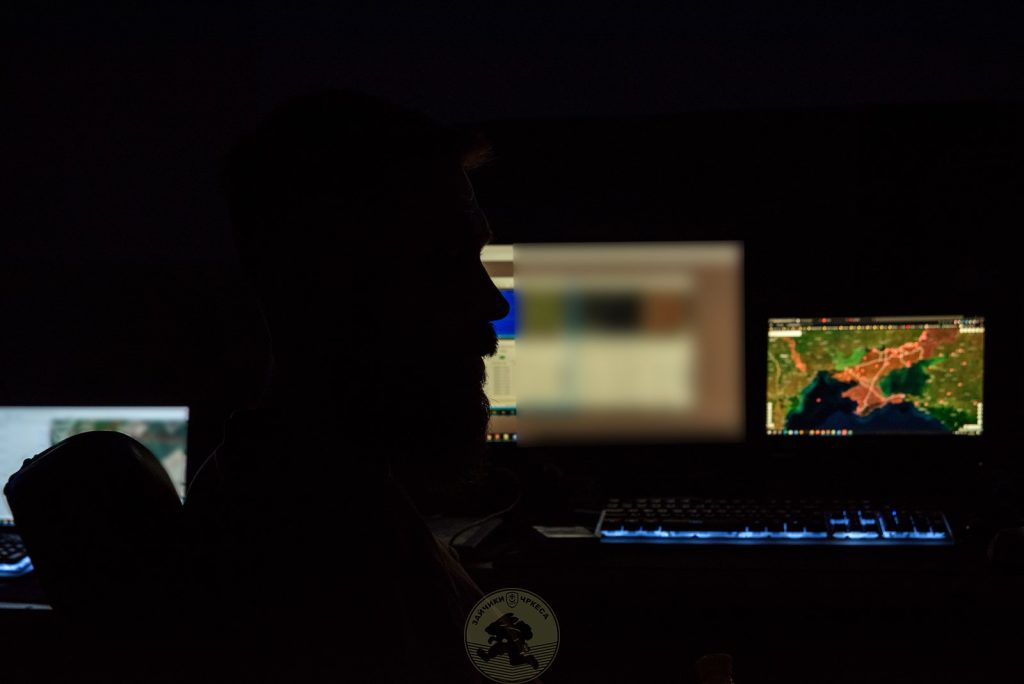INTERVIEW WITH THE CHIEF OF RADIO-ELECTRONIC INTELLIGENCE

INTERVIEW WITH THE CHIEF OF RADIO-ELECTRONIC INTELLIGENCE
– Please tell us about your unit. What are your duties and area of responsibility?
– Our zone of responsibility includes controlling the direction where our brigade is located, as well as the adjacent areas. A forest is usually considered as a slightly larger area of responsibility, a city — smaller one. The landscape also plays a significant role: sometimes it helps us a lot in our work, and sometimes it greatly hinders. Therefore, we can be in the front line or at a distance, if our technical means allow it.
As a rule, we cover our infantry and our special forces.
We are the ears of our fighters! We are the people who tell the brigade on time that artillery is being aimed at them; that enemy groups are moving; that, so to say, evil motherf****rs are gathering somewhere. Then we pass this information directly to our commanders and guys in the front line.
It is extremely important to give detailed information to those down in the front line. They are being shelled 24/7, a “bird”(drone) is flying around and looking for them, artillery is firing, helicopters are coming…
Our people in the frontline want to be informed on the radio when the artillery is used to target them, so that they can simply duck down. They need to know that a group of enemies is moving in their direction to be ready to meet them. They must be mentally and physically prepared. They must know this. And our task is to provide them with this information. If the katsaps have a “silence regime”, our people also need to be informed about it. And then they will be super attentive and will be listening and looking out.
We hear them (ed. – russians) much more often than our own relatives. For example, I hear my wife, at best, 20 minutes a day. But at the same time, I hear these bastards 24/7. This is also a job that someone has to do and perform efficiently. It’s not some kind of media work – we can’t show a nice picture, for example. We can show 4-5 recordings of funny conversation, maybe a dozen or twenty. We can sit and laugh at them. But in reality, the information we collect and use in a timely manner brings much more success.
– Can you share some specific examples of your work?
-When we hear the preparations, we immediately ring the bell and say: “Something is not going by the plan, something is wrong”. That is, the enemy starts moving personnel, bringing ammunition, chaotic shelling of positions, and weapon sighting. We hear all this and, based on this, provide information that something is being prepared. Sometimes, unscrupulous sources or online resources escalate the situation: “According to secret information from intelligence, the enemy is going to go on the offensive at night…”. We listen and there are no signs that this could happen. And accordingly, nothing happens. There are people who need information – and we give them this information. They process it, and at some moment a missile arrives at the right house. Who did it? It’s unknown who did it. The command observation post is gone, the general is a goner too. We don’t want any medals or orders for this. We just know that if there is one less command observation post, then at least our infantry will be able to rest. They will have more time to prepare their positions or get ready for assault operations. I know stories when people used the information obtained from this equipment to conduct successful counter-attacks.
When it turned out that there were not too many enemy personnel and we could just put a little pressure. I also know soldiers who, knowing that our radio station was taken by russians, would broadcast all sorts of nonsense.
Like, we have 10 tanks on the way, 4 APCs are coming, we are already entering and surrounding them. This stopped the f***ers – they were just afraid to go forward. Although, in fact, there were 10 people with great enthusiasm and desire to fight. And that was it.
If we had high-quality, expensive equipment, which we really lack, we, fanatics of our craft, would have found their command observation post by indirect signs: by their tea parties, movements

– Tell us about your speciality? What makes you different from other similar units?
– We started doing this because we felt a lack of information in general and, in particular, intercepts of enemy radio communications. The first intercepts were made by our unit using Baofengs (ed. – portable radios) when the fighting was going on at the Kozarovytska Dam. By that time, we had already tuned the Baofengs to the frequencies of the racists: we were listening to the shelling, evacuating people under fire, starting a medical evacuation under fire, and all this with Baofengs. But, given their ignorance at the beginning, most people thought that this was an unnecessary radio that just hung around and talked. In fact, I personally and many of our brothers-in-arms came out thanks to this information.
When we were under severe pressure from morning to evening, we managed to go on combat duty, set up new personnel, deliver ammunition, food, etc. So there was a clear understanding that we had to do this. And not in the “secret” mode, as most such structures do.
We have heard a lot of things! There are really a lot of things that an ordinary person would not be able to take in. A very large amount of information. We were in the forest of Kreminna listening to the attempts to capture a group surrounded by racists. And besides the fact that you have to endure this, you also have to use logic: you have to build logical chains, understand who and where, how their system is organized.
What is our speciality?
We share the information we gather with our neighbors and other electronic intlelligence structures. We know many people who are involved in this. We visited them, got to know them – many of them know us by sight.
No one ever sees these people (note: electronic intelligence specialists), but they are there, they do their work 24/7. The information they have saves a lot of lives!
This is the merit of the team. Because there are operators who process information. There are people who search for this information. There are technicians who assemble the equipment.There are people who analyze all this data and make corrections.
That is, in fact, all our work is focused on ensuring that people receive the most accurate and complete information on the situation from intercepts.

– How many people work for you simultaneously? How long does a shift typically last?– Shifts vary. On average, the working time lasts as long as the human body can normally withstand this flow of information. We have made a 3/3 or 3/6 schedule. We wish we had more operators and more equipment but due to lack of funds we are currently doing with this number of specialists. There is always a shift supervisor and anyone can come to the rescue if there is an assault or an intense broadcast. Then 4-5 people may be working at the same time.
– What about technical equipment? Are there any innovations that you use? As for the equipment base, I think we have more than average. More than many other units. We don’t have any expensive systems because usually 90% of the equipment is what we bought with our own money, with our salaries and what volunteers kindly bought for us.
What kind of people do you lack in your unit?
– Maybe people will criticize me and say that I’m wrong, but I would gladly recruit individuals who have injuries or health issues but possess strong motivation! In our country, there are many people with disabilities: those, who due to their health condition, are not ready to serve but can contribute much more by doing the kind of work we do than just staying at home or simply recovering their strength. There are indeed many people with disabilities, some without legs or arms, but with a strong desire to continue participating in this war. This is the best motivation. I have an example. Near Lyman, there’s a café at the exit. We stopped there for a coffee. A BMW car pulls up. A young guy with tattoos is sitting there, listening to some music. The immediate question arises: “What are you doing here with this car?” But a moment later, this young man gets out of the car – with an iron leg prosthesis… However, he didn’t crumble, and he continues to fight. It’s unbelievable! They can become better professionals and motivate those who lack motivation. Their motivation is enormous. And why not! Such a person can be taught, explained to, shown, and they will efficiently perform their duties. We have people who are willing to serve in our unit, but they have vision problems due to injuries. It’s challenging for them, but we even consider the option of involving them. An operator should have an average technical knowledge. Then, military training and understanding of how technologies work.
– Could they work remotely from their homes, for example?
For security reasons no. But working from a unit or an office, yes. From a place where there will be no information leakage.
What would you like to change or improve in the system in which you work now?
In fact, I would like a more real Lend-Lease, which is there. Equipment. Quite possibly, qualified training. Because in this work, people must clearly understand many military subtleties. People who, for example, do military service in special forces, have the skills and knowledge that we use every day. Starting with how long the “Mavik” flies in the air, ending with the speed of movement of the group in night conditions, shelling, knowledge of artillery and many other nuances.We gradually acquire all these skills, and almost every day I have some discoveries about military craft, which we successfully apply.
Therefore, I would like more people who could explain, tell, teach, and provide a basis for further development. We lack the basic education of the same infantrymen. Many are afraid to use the same GPS. Many people think that using a compass is a very cool thing. But in half of the cases, it simply does not work, because a bunch of debris flew and the compass does not show normally. This is a really big problem. Because this knowledge must be provided to people. It is necessary to teach them. Our non-commissioned officers do not know how to use walkie-talkies. That is, a person is given “Haytera” worth 60 thousand hryvnias. A person wants to connect it to headphones, but the adapter costs 3 thousand hryvnias. It is expensive for him. And every time he takes off the earphone or hangs up the walkie-talkie for some reason, he himself suffers. But at the same time, he cannot spend 3 thousand on an adapter.

What is the most difficult thing about your work for you personally?
The most difficult thing is to hear what is happening and try to convey information to those people who are in the trenches, surrounded, under fire, at the frontline. And the most difficult thing is to convey this information so that they use it correctly. This is the first. And second, you need to be able to filter information. Sometimes there is so much of it in 5 minutes that you have to separate the useful information from the garbage and pass the useful information on, or use it instantly. What we do is operational work that saves dozens of lives. I know many units that, thanks to our information, got out in time, withdrew with less losses. And the most difficult thing is just to stay in good shape and not burn out. Because there is a lot of information, it passes through you. There are no opportunities to pour out the negativity that we perceive from the air. And how many times do we hear when shelling is going on and we can’t do anything about it… I think this is the most difficult. Our motivation did not start until February 24. It was much earlier: there was aspiration, understanding. We, in turn, are more volunteers who are engaged in the work that is not being done in full by the specialists who should be doing it.
– And the last question for you: who should be donated?
– Regarding donations, I will say this: we have a salary. I can officially declare that I wasted a million on the equipment I work with. Perhaps it is more difficult for many people who currently live in Ukraine than for us. Therefore, those who want will help. Those who do not want to, will never help under any circumstances.